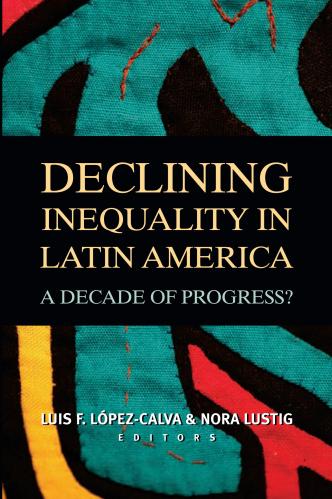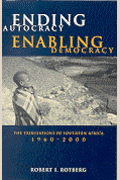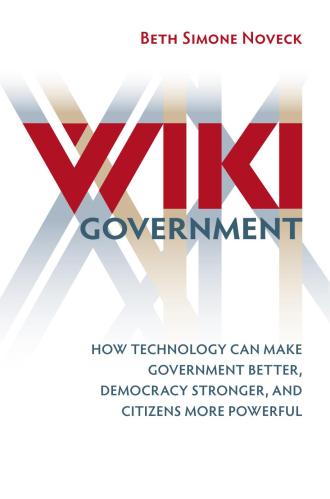This interview is adapted from a segment in the Brookings Cafeteria podcast called “Coffee Break,” where a scholar new to Brookings introduces their background, research interests, and offers book recommendations. The transcript has been slightly edited from the audio recording.

I’m Camille Busette, I’m a senior fellow in Governance Studies and I head up the new Race, Place, and Economic Mobility initiative here at Brookings.
Q: Where did you grow up?
A: I grew up in a variety of places actually, which I think has made me very much who I am. I was born in Los Angeles. I grew up in New York City, and then toward the end of high school my family moved to Sacramento, California where I finished up high school; and then I went on to University of California, Berkeley for college.
But I think what’s probably more important than where I grew up is actually my family background.
My family is originally from the Caribbean, and we did spend a lot of time during the summers visiting my relatives in a variety of different places: the Dominican Republic, Puerto Rico, Trinidad and Tobago, and some other islands. And part of why I think that’s important is that a lot of my relatives are very low-income.
And I think it gave me an opportunity to see the differences pretty early. So by the time I was six, seven, eight, I kind of could tell there was a big difference between their standard of living and the standard of living I enjoyed here in the U.S., and I think that’s a big part of who I am now.
Q: What inspired you to become a scholar?
A: I’m very interested in social problems and really trying to innovate and find solutions to those.
My parents were pretty highly educated. My dad had a Ph.D. in Spanish language and literature and my mom was an ABD in economics and so I grew up in a household that was very engaged intellectually and very curious intellectually, and we were really encouraged to be pretty much the same. I was just, in general, kind of a very curious person.
But when I got to graduate school I put that in into overdrive and saw that where I flourish and what really motivates me is when there is an unsolved puzzle–whether it be empirical or theoretical or practical–where I could take a different set of perspectives and apply that to this puzzle in order to solve it. So that to me is actually really interesting and it’s one of the reasons I’m here doing this at Brookings.
Q: What are you working on now?
A: The Race, Place, and Economic Mobility Initiative is a new initiative, and Brookings has been working in this space a little bit since 2015, but not as an official initiative. So we have scholars like Richard Reeves, and our colleagues in the Metropolitan Policy Program, and other places in Governance Studies that have contributed to some really excellent scholarship already. But what I plan to do with this initiative is try to focus it on recrafting and updating the iconic American narrative, which I think needs to be very inclusive of who we all are. And in doing that I think I’m going to bring to bear a lot of different kinds of disciplines, everything from the typical social science disciplines that we’re familiar with here at Brookings, to looking at how we can structure a campaign around race and inequality and economic mobility that’s not dissimilar to some of the campaigns that have been run recently like the gay marriage campaign and anti-smoking campaign.
Obviously I need to set up the program; there’s an operational piece of that. But the first thing we’re going to be working on now is the demographic profile of young men of color with respect to economic mobility.
Q: What do you think is the most important issue we’re facing today?
A: I think the most critical challenge that we face is the persistence of barriers to social and economic inclusion that perpetuate inequality and that prevent individuals from reaching their potential and their aspirations. That’s actually a really serious problem that we have. My previous work at the World Bank took the form of extreme poverty and lack of access to health, education, sanitation, those kinds of things, and to the labor market. And in the work that I’m doing here at Brookings, which is much more domestically focused, we have a very significant issue with racial inequality and with the lack of economic mobility more generally.
Q: If you could recommend any book to our listeners, what would it be?
A: I have two recommendations that I think are pretty critical to understanding the work that I’m going to be focusing on here at Brookings. The first is a book-length poem called “Citizen” by Claudia Rankine, and it won the 2014 National Book Critics Circle Award in Poetry. It’s a very intimate look at what it’s like to live in a world where you aren’t seen and where your presence isn’t considered an asset.
And the second book is entitled “Toxic Inequality.” It’s by Thomas Shapiro at Brandeis, he’s a very well-known scholar who has been working on wealth and assets and inequality for decades. And in his book he argues that wealth inequality is structural and results in persistent disparate outcomes by race.
Those are two really excellent starter books and very very interesting. I’m also really eager to dig into my colleague Richard Reeves’ book, “Dream Hoarders,” which has just been published and I think having seen him with David Brooks a couple of nights ago, I think that’s a really interesting perspective on inequality as well.
Communications Intern Melissa English contributed to this post.
The Brookings Institution is committed to quality, independence, and impact.
We are supported by a diverse array of funders. In line with our values and policies, each Brookings publication represents the sole views of its author(s).





Commentary
Meet Camille Busette, new director of the Race, Place, and Economic Mobility Initiative
June 16, 2017